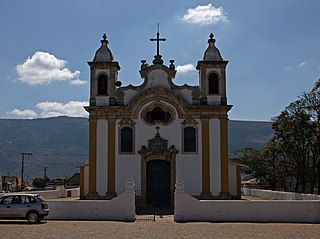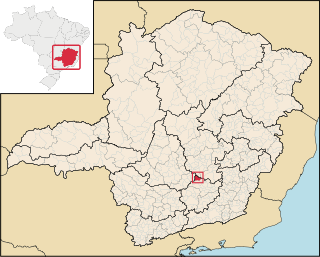
Belo Horizonte is the sixth-largest city in Brazil, with a population of around 2.3 million, and the third largest metropolitan area, with a population of 6 million. It is the 13th-largest city in South America and the 18th-largest in the Americas. The metropolis is anchor to the Belo Horizonte metropolitan area, ranked as the third most populous metropolitan area in Brazil and the 17th most populous in the Americas. Belo Horizonte is the capital of the state of Minas Gerais, Brazil's second-most populous state. It is the first planned modern city in Brazil.

Contagem is a city in the center of the state of Minas Gerais, in Brazil. It is only 21 kilometres from the capital, Belo Horizonte, and forms part of a metropolitan area with a population of 4.8 million.

Montes Claros is a city located in northern Minas Gerais state, in Brazil. It is located north of the state capital, about 422 km away from it. The population is 413,487 in an area of 3,569 km2 (1,378 sq mi). It was made a seat of a municipality in 1831 and attained city status in 1857.

Ipatinga is a municipality in eastern Minas Gerais state, Brazil. The city was founded on 29 April 1964 and covers a total area of 164.8 km2 (63.6 sq mi). Its population is 227,731 as of 2022. It is part of the Vale do Aço metropolitan area.

Itabira is a Brazilian municipality and a major city in the state of Minas Gerais. The city belongs to the Belo Horizonte metropolitan area mesoregion and to the Itabira microregion.

Ibirité is a Brazilian municipality located in the state of Minas Gerais. The city belongs to the mesoregion Metropolitana de Belo Horizonte and to the microregion of Belo Horizonte. Its population in 2020 was 182,153.

Ouro Branco is a Brazilian municipality located in the state of Minas Gerais. The city belongs to the Mesoregion Metropolitana de Belo Horizonte and to the Microregion of Conselheiro Lafaiete. As of 2020, the city has a population of 39,867 inhabitants. The name "Ouro Branco" means "White Gold", as opposed to "Black Gold" - Ouro Preto. The city was an important base on the transportation route from the mines of Minas Gerais to the coast.
Cidade Nova is a neighborhood of the northeast region of Belo Horizonte. It was established in the 1960s, and was quickly developed by the Banco Nacional da Habitação.

Belo Horizonte Metro is a rapid transit system serving the city of Belo Horizonte, in the state of Minas Gerais in Brazil. The system has one 28.1-kilometre (17.5 mi) line which serves 19 stations. The Metro carried 54.4 million passengers in 2019, or approximately 150,000 passengers per day. The system is operated by Metrô BH company, which is part of the Comporte Group. Two more lines are planned.

Vespasiano is a municipality in the Belo Horizonte metropolitan region in the Brazilian state of Minas Gerais, located 27 kilometres (17 mi) north of Belo Horizonte.

Rio Vermelho is a Brazilian municipality located in the state of Minas Gerais. The city belongs to the mesoregion Metropolitana de Belo Horizonte and to the microregion of Conceição do Mato Dentro. As of 2020, the estimated population was 12,739.

Nova União is a municipality located in the Brazilian state of Minas Gerais. The city belongs to the mesoregion Metropolitana de Belo Horizonte and to the microregion of Itabira. As of 2020, the estimated population was 5,732.

Belo Vale is a municipality in the state of Minas Gerais, Brazil. It is located 82 km south of Belo Horizonte, the state capital. The population was 7,719 inhabitants in 2020.
Cidade Nova can refer to:
Cidade do Galo is Clube Atlético Mineiro's training ground, located in Vespasiano, a municipality adjacent to Belo Horizonte, Brazil. Construction of the first training pitch started in 1982, but for almost three decades the facility was gradually improved, with Clube Atlético Mineiro's first squad training in the grounds for the first time in 2001, and the official inauguration happening in 2006. Cidade do Galo has been selected as the best training facility in Brazil and one of the best in the world.
Vila Olímpica is Atlético Mineiro's former training ground, located in Belo Horizonte, Brazil. Inaugurated in 1973, it served as the club's main training facility for almost three decades, before Cidade do Galo was built. It also hosted the Brazil national football team in its preparation for the 1982 FIFA World Cup. The facility is currently a leisure club for Atlético Mineiro's associates.
Eldorado is a Belo Horizonte Metro station on Line 1. It was opened on 1 August 1986 as the southern terminus of the inaugural section of the line, from Eldorado to Lagoinha. The adjacent station is Cidade Industrial.

Cidade Industrial is a Belo Horizonte Metro station on Line 1. It was opened on 1 August 1986 as part of the inaugural section of the line, from Eldorado to Lagoinha. The station is located between Eldorado and Vila Oeste.

Sylvio Carvalho de Vasconcellos was a Brazilian architect and architectural historian, also recognized as one of the pioneers of Brazilian modernist architecture in the state of Minas Gerais.
The 2021 Campeonato Brasileiro Feminino A-2 is the 5th season of the Campeonato Brasileiro de Futebol Feminino Série A2, the second level of women's football in Brazil. The tournament is organized by the Brazilian Football Confederation (CBF). It started on 15 May and scheduled to end on 5 September 2021.














